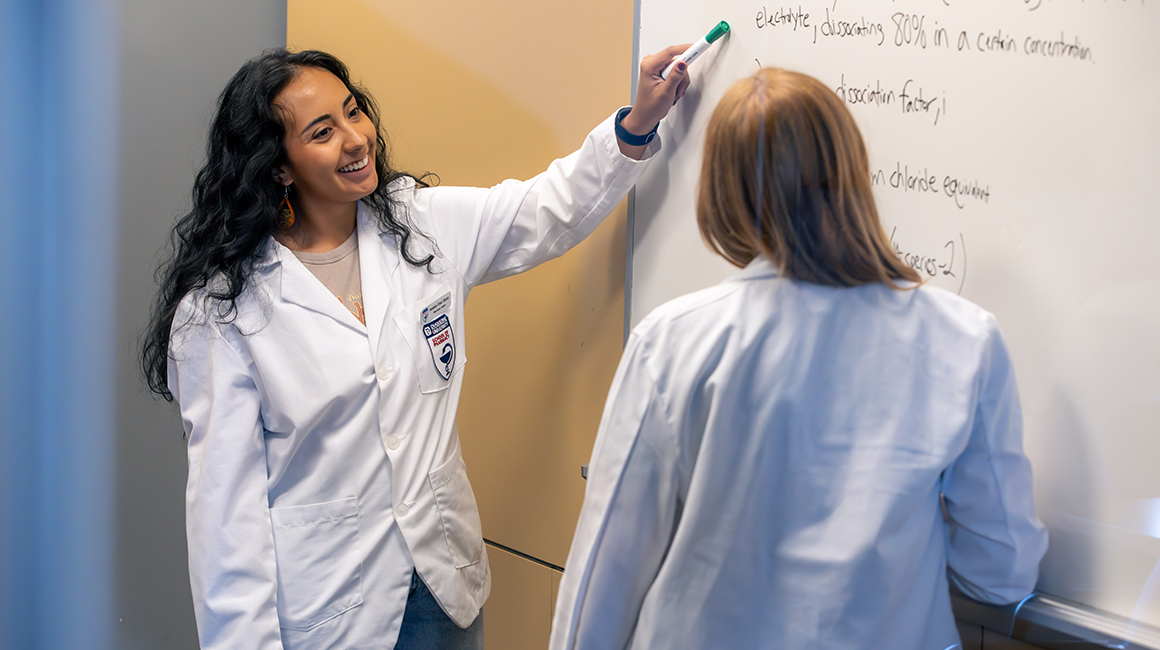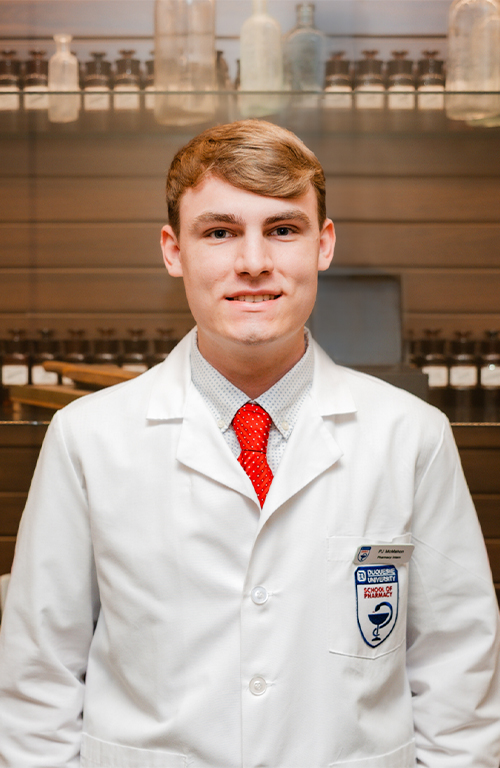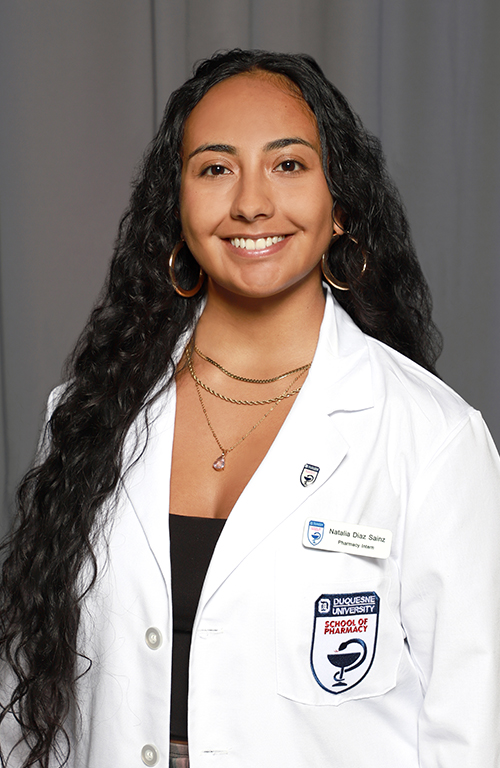Build the Bridge to Your Future in Pharmacy
Whether you’re an undergraduate student in the pre-professional phase or have already completed your bachelor’s degree and are progressing toward your Doctor of Pharmacy degree, you'll achieve your bigger goals faster and more affordably with our transfer pathways.
Explore your way to a Pharm.D. degree and pharmacy licensure at Duquesne. Learn how to prepare for transferring into our pharmacy school, including requirements, prerequisites, and essential dates and deadlines.
Why Transfer to Duquesne's Pharm.D. Programs?
- Rigorous Pharmacy Curriculum: Complete your professional phase (four years) online or on campus
- Affordable Tuition: Undergraduate merit scholarship and 15% discount for graduate students
- Seamless Credit Transfer: Articulation agreements with over 20 colleges and universities in PA, NY, WV, and OH
Ready to continue your pharmacy education at Duquesne?
Take a look at the applications requirements and complete our inquiry form to receive additional information and get connected to an Admissions Coordinator.
By The Numbers
A current undergraduate student who has completed four semesters and a minimum of
64 credits (including required prerequisite courses) can transfer directly into the
professional phase of our on-campus Pharm.D. program. Students with a bachelor’s degree can also transfer into the on-campus Pharm.D. program.
They must have earned the science and math credits within the pre-professional phase.
The Online Doctor of Pharmacy program invites eligible undergraduate students to continue their studies at Duquesne. The
first three years of our online program consist primarily of online learning but require
students to come to our Pittsburgh campus four to five times a year to complete the
curriculum's laboratory and professional development components. We also hold three
to four weeks of introductory experiential learning in the summer semester. In the
final year, students focus on their practicums, working in various clinical settings. To be considered for the online program, transfer applicants must have completed four
semesters and at least 64 credits, including the prerequisite courses.Why Choose Us?
Duquesne University has active articulation agreements with the following colleges
and universities:
Pharm.D. Transfer Pathways
To learn more about continuing your education as a graduate student, please contact
the Assistant Dean of Enrollment Management and Retention, Jason Stack, to discuss your specific situation.
How to Apply as a Transfer Student
To qualify for admission into Duquesne’s Pharm.D. programs, you must have:
- Maintained a minimum GPA of 2.5. Our admissions committee considers a GPA of 3.0 or higher on a 4.0 scale to be competitive.
- Completed 64 credit hours of prerequisite courses, earning at least a “C” or above.
If you have already earned your bachelor’s degree, you must apply as a graduate student. If you do not have a degree, you will submit your application as an undergraduate transfer student.
Once accepted, you will be required to complete a background check conducted by CastleBranch prior to matriculating to the School of Pharmacy.
Duquesne's Pharm.D. programs begin in August; you may not apply for entry to a specific semester. The class functions as a cohort, going year-round for four years.
Our rolling admissions cycle for the online Pharm.D. application begins August 1. Our Admissions Committee evaluates your application on a first-come, first-served basis.
Transfer applicants must have completed the following prerequisite courses or their equivalent from an accredited two-year or four-year U.S. college or university:
| General Biology I & Lab | 4 cr, |
| Human Anatomy & Physiology I | 3 cr. |
| Human Anatomy & Physiology II | 3 cr. |
| Microbiology | 3 cr. |
| General Chemistry I & Lab | 4 cr. |
| General Chemistry II & Lab | 4 cr. |
| Organic Chemistry I & Lab | 4 cr. |
| Organic Chemistry II & Lab | 4 cr. |
| Calculus I | 4 cr. |
| Statistics | 3 cr. |
| English (Composition & Literature) | 6 cr. |
| Humanities | 21 cr. |
If applicants have obtained a grade lower than a "C" in a prerequisite course, they
must retake it and get a grade of "C" or above.
As a transfer-friendly university, we strive to streamline the process and ensure that your hard work and previous academic experiences count toward your DU education. If you have questions about transferring your credits, we encourage you to contact your admissions counselor. If you haven't met them yet, just email the Admissions%20Team to set up an appointment and start planning for your transfer.
As a pharmacy student at Duquesne, you will be responsible for fees and expenditures, in addition to tuition, once you enter the professional phase and clinical rotations. These fees support your involvement in pharmacy student organizations and help you get the clearances and vaccines required for rotations, preparing you to reach your bigger goals in becoming an empowered pharmacist. All fees are subject to change.
All Transfer Students
| Item | Fee |
|---|---|
| Student Activity Fee | ~$289/Semester |
| Experiential Education – PA Intern License (including FBI Fingerprint) | ~$85 (one-time fee) |
| Experiential Education – Clearances (Child Abuse, FBI Fingerprint) | ~$38/year |
| Experiential Education - Health Requirements (physical, titers, Two Step TB Test) | ~$280 (one-time fee) |
| Experiential Education – Flu Vaccine and TB Skin Test | ~$20+ (dependent on insurance co-pay)/year |
| Experiential Education – Rotation Specific Requirements | Costs vary and could include additional background checks, drug screening, housing, parking, travel costs, etc. |
| Student Professional Liability Insurance | ~$43/year |
| EHR Go | ~$365/total |
| NAPLEX Preparation Materials | ~$175 (one-time fee) |
| Licensure/Board Exams (Fees can be paid before or after graduation) | ~$1,070 |
| Graduation Regalia | ~$200 |
| Health Insurance | If students do not have health insurance, they will need to enroll in the Student Health Insurance Plan (SHIP). |
On-Campus Pathway Transfer Students
| Item | Fee |
|---|---|
| Housing/Food/Campus Parking | Varies based on student preference and availability. |
| Electronic Devices | ~$649 iPad |
Online Pathway and Extended Pathway Transfer Students
| Item | Fee |
|---|---|
| On-Campus Requirements at Duquesne University | Varies depending on the student's location. The average number of required days on-campus
can range between 15-20 days over the courses of professional years 1-3. The University partners with a local hotel (within walking distance of campus) for a discounted nightly fee if needed (~$150/night - subject to change). All travel costs associated with getting to and from Pittsburgh are the responsibility of the student. While some meals may be provided by the school, students should anticipate dining costs while visiting campus. |
| Electronic Devices | ~$1499 Laptop |
Depending on the program in which you enroll, you may be eligible for different financial assistance. For example, students accepted as undergraduates qualify for a merit scholarship that is applied annually over the duration of the program. Or, if you are accepted as a graduate student, you may receive a 15% tuition discount award to help cover your educational expenses. Learn about Duquesne's tuition rates.
Affording Your Pharm.D. Degree
We understand that you may be entering Duquesne University's Pharm.D. Program at a different academic status than your peers. That's why we deliver a high-value education that's accessible and affordable to all, no matter where you're at in your journey. Enrolling in the professional phase of the Pharm.D. program with a bachelor's degree makes you eligible for different financial assistance compared to joining the program without a bachelor's degree.
Applying as an undergraduate student will enable you to receive a merit scholarship for the entirety of the program. Or, if you are accepted as an undergraduate student, you may receive a 15% tuition award to help cover your educational expenses. Find out more about Duquesne’s tuition rates.
Contact The Admissions Team!
Jason Stack, Ed.D., MBA
Hear from Duquesne's Future Pharmacists
Begin Your Transfer Application Today
No matter where your education began, you can continue learning at Duquesne University.
Step into your future as a pharmacist by transferring to our on-campus or online Doctor
of Pharmacy program. Both graduate programs offer high-quality pharmaceutical education
that enriches your expertise and helps you build a successful career in the health
care field.
Submit Your Application
Follow Us
Accreditation
Duquesne University's Doctor of Pharmacy program is accredited by the Accreditation Council for Pharmacy Education, 190 South LaSalle Street, Suite 3000, Chicago, IL 60603, 312-664-3575; Fax 866-228-2631, website: www.acpe-accredit.org




